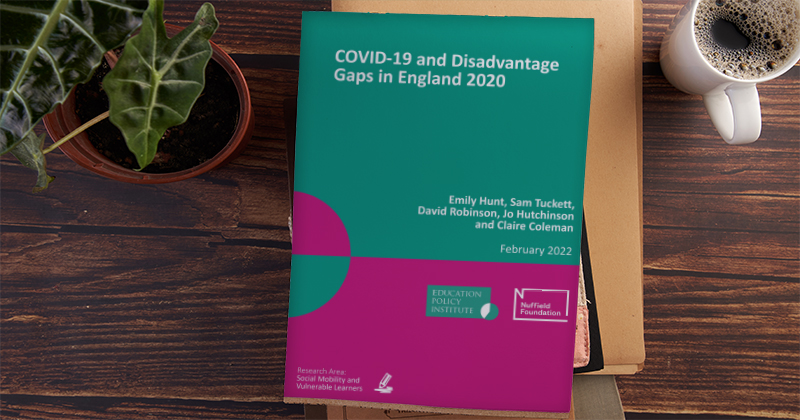The gap in grades between poorer sixth form students and their better off peers widened in 2020, Education Policy Institute research has found.
Researchers said the gap was a result of A-level students gaining a whole grade more from teacher assessments than those who studied qualifications such as BTECs.
EPI said that because disadvantaged students are more likely to take applied general qualifications like BTECs, they may have lost out when competing for university places.
“Our research findings are very clear,” said David Robinson, report co-author and director of post-16 and skills at the EPI.
“These growing inequalities were driven by A-levels gaining more from the system of teacher assessed grades than applied general qualifications, which far more disadvantaged students take.
“The result is that poorer students could have lost out when competing for university places. These findings ought to alarm the government, and we hope that urgent action is taken to ensure that students taking BTECs and other alternatives to A-levels do not lose out again in 2022.”
The report found that disadvantaged students in 16 to 19 education were on average the equivalent of 3.1 A-level grades behind their more affluent peers across their best three qualifications in 2020, compared to 2.9 grades in 2019.
Students in 16 to 19 education in long-term poverty – those who spend at least 80 per cent of their school lives on free school meals – saw much larger gaps, and they have now widened significantly.
And the 16 to 19 disadvantage gap for students in this long-term poverty group stood at 4 grades in 2020, compared to 3.7 in 2019.
“Students from lower income families are less likely to study A-levels, which saw larger grade increases in 2020 than applied general qualifications such as BTECs,” said Cheryl Lloyd, education programme head at the Nuffield Foundation.
“This means that young people from disadvantaged backgrounds were effectively penalised for not studying A-levels, and the disadvantage gap in 16 to 19 education has become further entrenched.”
Sixth form and college students in some regions saw greater increases than in others. Grades increased the most in London and the East Midlands, but students in the North West, Yorkshire and The Humber and the North East only saw modest rises.
EPI said these regional differences have significant implications for the government’s “levelling up” agenda.
Bill Watkin, chief executive of the Sixth Form Colleges Association, told FE Week: “Last summer’s grades were awarded on the basis of evidence gathered by teachers.
“Different centres approached the gathering of evidence in different ways, and students had different experiences of online teaching, covid health and assessment, so it is not surprising that there were inconsistencies.
“The freedom and flexibility for different centres to apply the rules in different ways to reflect variability in learner experiences was consciously baked into the system.”
Watkin added that students were always going to be awarded a grade based on the evidence that showed their best performance.
“Slip-ups and off-days that are the downfall of some students on exam days in more normal circumstances were not a factor, so it is not surprising that grades were up.”
He explained that the monitoring and moderation of grades by exam boards was inevitably limited and there was no appetite for another, even improved, algorithm.
“So, there was no mechanism to iron out the apparent inconsistencies. The grades awarded to students in the recently reformed and more rigorous AGQs, now with an external assessment (exam) component, suffered in comparison with A Levels.
“This matters because BTECs and other similar qualifications often represent a vital pathway for young people from more disadvantaged backgrounds to compete in the market for HE places and eventually professional careers,” he added.
The Department for Education was approached for comment.









Your thoughts